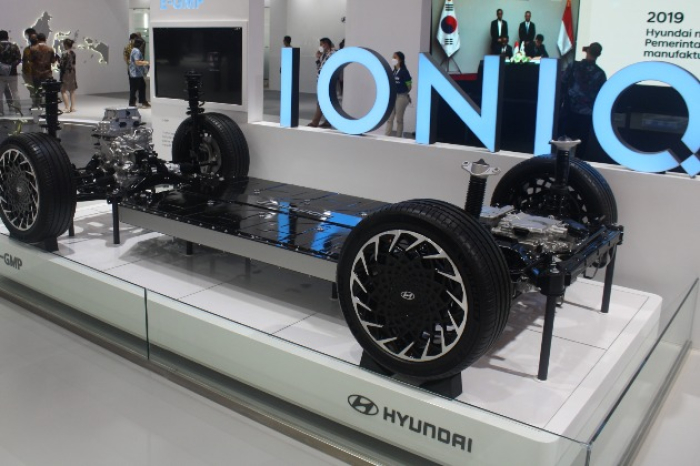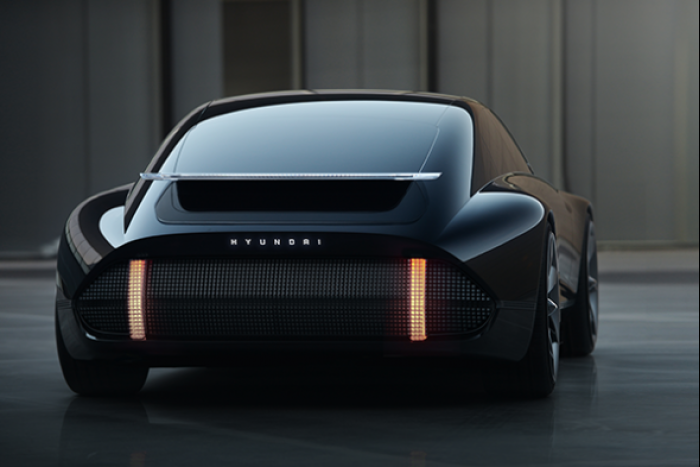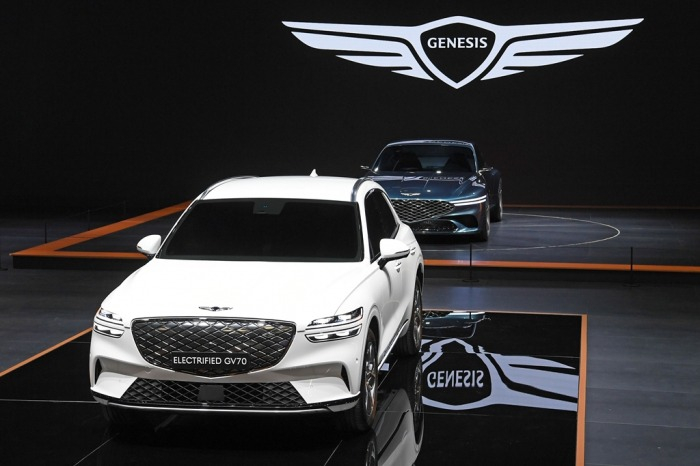Hyundai Motor eyes EV battery production from 2027
It will likely produce ternary prototype batteries, say sources
By Sep 24, 2024 (Gmt+09:00)
LG Chem to sell water filter business to Glenwood PE for $692 million


KT&G eyes overseas M&A after rejecting activist fund's offer


Kyobo Life poised to buy Japan’s SBI Group-owned savings bank


StockX in merger talks with Naver’s online reseller Kream


Meritz backs half of ex-manager’s $210 mn hedge fund



Hyundai Motor Co. is preparing to build its first electric vehicle battery production lines by around 2027, taking its first step to internalize battery technology in line with its push to boost EV performance and cost competitiveness, according to people with knowledge of the matter on Tuesday.
It is considering setting up the production lines with a capacity of 1-2 GWh at its R&D center to be constructed in Anseong, Gyeonggi Province. One gigawatt hour (GWh) corresponds to the battery power to run 13,000 EVs.
It will manufacture prototype battery products there, separate from the batteries it purchases from battery cell makers, the sources told The Korea Economic Daily.
The largest carmaker in South Korea has been in talks with cathode materials suppliers such as L&F Co., LG Chem Ltd. and Chinese materials companies since the second quarter of this year to directly purchase the battery materials.
They are now negotiating the volume and price of the supplied cathodes, which will be shipped from around 2027, they added.
It is highly likely to churn out ternary batteries such as nickel-cobalt-manganese (NCM) batteries, said the sources.
Hyundai is also considering outsourcing the production of batteries it designs to SK On and other battery cell makers under original equipment manufacturing contracts, instead of manufacturing them at its production lines.
If succeeding in internalizing battery technology, Hyundai will be able to enhance its production efficiency and competitiveness by installing its EVs with tailor-made batteries.

EVs under the brands of Hyundai, its sibling Kia Corp. and Hyundai’s premium sub-brand Genesis are equipped with pouch-type NCM, or nickel-cobalt-manganese-aluminum (NCMA) batteries, supplied by SK On Co. and LG Energy Solution Ltd.
Its battery production will also facilitate its advance into the battery recycling market.
Its prototype battery production will unlikely cut the volume of batteries it buys from SK On and other bettery cell makers.

Hyundai is not alone in pursuing battery technology internalization. Batteries account for 40% of EV manufacturing costs and determine much of the vehicles' performance, such as mileage.
Tesla is mass-producing 46-pi cylindrical batteries that fit into its EVs. Battery cell makers have not yet produced these so-called next-generation batteries.
BYD has equipped 80-90% of its EVs with its own batteries. The Chinese carmaker has reduced EV manufacturing costs by internalizing the battery technology.
General Motors Co. and Toyota Motor Corp. recently announced battery cell production plans.
Meanwhile, Hyundai has recently slashed its 2030 vehicle sales targets by 6% to brace for a protracted slowdown in EV uptake.
Write to Sang Hoon Sung, Kyung-Kyu Kim and Woo-Sub Kim at uphoon@hankyung.com
Yeonhee Kim edited this article.
-
 Corporate strategyHyundai Motor cuts 2030 sales goals as EV chasm likely protracted
Corporate strategyHyundai Motor cuts 2030 sales goals as EV chasm likely protractedSep 19, 2024 (Gmt+09:00)
3 Min read -

-
 AutomobilesHyundai, Kia post record August US sales, driven by hybrids, EVs
AutomobilesHyundai, Kia post record August US sales, driven by hybrids, EVsSep 05, 2024 (Gmt+09:00)
3 Min read -

-
 Electric vehiclesHyundai Mobis develops nickel-free inductor material
Electric vehiclesHyundai Mobis develops nickel-free inductor materialAug 27, 2024 (Gmt+09:00)
1 Min read -
 Electric vehiclesHyundai to develop EREV powertrain for electric pickup, Santa Fe, GV70
Electric vehiclesHyundai to develop EREV powertrain for electric pickup, Santa Fe, GV70Aug 13, 2024 (Gmt+09:00)
4 Min read -
 Future mobilityElectrification, Hyundai Mobis’ growth engine for future mobility
Future mobilityElectrification, Hyundai Mobis’ growth engine for future mobilityAug 09, 2024 (Gmt+09:00)
3 Min read -
 Electric vehiclesHyundai eyes Japan’s commercial EV market in e-bus deal with Iwasaki
Electric vehiclesHyundai eyes Japan’s commercial EV market in e-bus deal with IwasakiJul 23, 2024 (Gmt+09:00)
2 Min read -
 BatteriesKorea to keep track of EV battery life cycles for recycling
BatteriesKorea to keep track of EV battery life cycles for recyclingJul 10, 2024 (Gmt+09:00)
2 Min read


